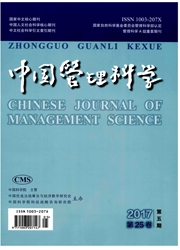

 中文摘要:
中文摘要:
我国对节能减排实施了范围较广的补贴政策。本文在考虑政府节能减排补贴政策的情况下,构建了企业与政府补贴信号博弈模型以分析两方策略的选择机制及影响因素,研究表明:由于信息的不对称性和不完全性,政企博弈将出现市场部分成功、完全成功、完全失败三种均衡,且市场均衡效率受到作假的伪装成本和期望风险成本的影响,故实现市场完全成功均衡的关键条件是提高企业造假的伪装成本和期望风险成本,由此得出相应的解决对策应聚焦于进一步细化政策、标准,并提高检查复查效率、设置较大的惩罚力度、建立基础性数据库等方面;通过对政府与企业合谋情形进行分析,认为建立更全面、多维度的考核指标,发挥社会公众、媒体第三方的质询和监督权可有效约束政企合谋行为。
 英文摘要:
英文摘要:
Subsidy policy for energy saving and emission reduction has been widely used in our country, but the high-cost expenditures promote the existence of gaming between enterprise and the government in the process of advancing energy saving and emission reduction. Considering the subsidy policy for energy saving and emission reduction, a signaling game model of enterprise and government on subsidies is constructed in this paper. Owing to information asymmetry and imperfection, three kinds of equilibrium including complete success, partial success and complete failure come to existence, and efficiency of market equilibrium will be influenced by the disguised cost and expected risk cost, therefore, the key to achieve completely successful balance is to improve the camouflage cost of enterprise fraud and the expected cost of risk, and thus appropriate policies should be focused on fields such as refining policies &standards, increasing the efficiency of checks and setting penalties in large. By a simple analysis of collusion between government and enterprises it suggests that building a more comprehensive and multi-dimensional assessment indicators, giving play to inquiry and supervision raised by third parties such as the public and media can constrain the collusion between government and enterprises effectively.
 同期刊论文项目
同期刊论文项目
 同项目期刊论文
同项目期刊论文
 期刊信息
期刊信息
